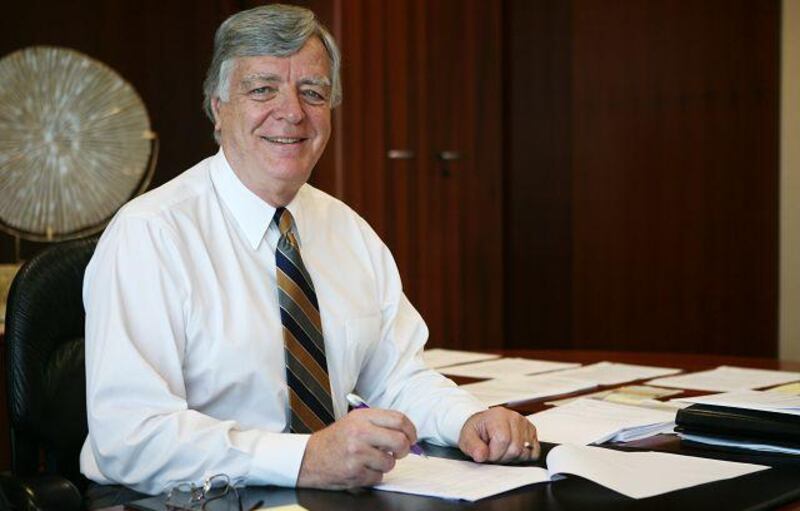ABU DHABI // Leading figures in education said yesterday that moves by federal universities to specialise in different fields reflected the country's increasingly diverse economy, and its consequent demand for expertise in a variety of areas. UAE University in Al Ain recently announced plans to recruit hundreds of PhD students, particularly in technical subjects such as engineering, while Zayed University is looking to almost double its undergraduate intake.
The third federal higher education institution, the Higher Colleges of Technology (HCT), will continue to focus on technical professional programmes in areas such as business, education, engineering and information technology. Dr Simon Jones, the director of Abu Dhabi Men's College, which is part of the HCT, called the evolution of the federal universities "a sign of the strength of the UAE economy".
"It's diversifying, and higher education is adapting to meet its needs," he said. "The economy is now not just a petrochemical economy; there's financial services, construction and tourism. "Just like the economy is diversifying, the institutions that support the economy are diversifying." He said the HCT had a "20-year track record" of delivering professional programmes because these were "what the country needs to grow".
Officials from the institutions have met and outlined their strategies to each other, agreeing that they would follow different tracks as they grew and aimed to improve their regional and global standing. According to Bryan Gilroy, director of Zayed's academic bridge programme, taken by more than four-fifths of high-school graduates who join the university to bring them up to speed in English, the universal language of instruction, the federal universities should complement each other rather than offer similar degrees. "The sector is maturing, and we don't see ourselves as competing with each other," he said.
"Obviously some offerings will be similar, but it doesn't help the growth of the education sector if they're offering the same thing. "It doesn't seem to be particularly efficient if we offer the same programmes. We exist in different areas of the country, and there are different needs." Included in Zayed's five-year strategy report, Destined to Lead, is its aim of becoming "the leading university in the region", something Mr Gilroy said the university could achieve without large numbers of PhD students.
"For me the leading university means being the best in the region at what we do," he said. "We could become quite easily the best undergraduate and masters university." Just as the federally funded universities are developing, so the higher education sector as a whole has shown rapid growth and diversification in recent years, although it retains an emphasis on subjects such as business, IT and engineering at the expense of programmes in literature, politics and history.
Many foreign universities have opened branch campuses in the UAE, mostly in three main education free zones: Dubai Knowledge Village, Dubai International Academic City (DIAC) and Ras al Khaimah Free Trade Zone Academy Zone. Non-federal but UAE-based universities, such as Abu Dhabi University and Khalifa University of Science and Technology and Research (Kustar), have also grown rapidly and are expanding their research programmes.
As with the federal institutions and some of the branch campuses, these universities are focusing their research on areas such as alternative energy that are relevant to the UAE economy. There are now nearly 60 institutions licensed by the Ministry of Higher Education and Scientific Research, in addition to those institutions in the free zones that are not licensed. Some free zone universities are, however, licensed by the ministry and have programmes accredited by its Commission for Academic Accreditation.
Prof Brian Smart, the executive dean of the DIAC branch of Heriot-Watt University, a Scottish university, said his campus was already contributing significantly to the economy by carrying out research in the oil industry, energy saving and the environment. If the maturity of the higher education sector is measured by its contribution to the economy, Prof Smart said, "we're doing that on a daily basis".
"The next step in the maturing process would be to have PhDs," he said. Heriot-Watt is recruiting PhD students, while Kustar already offers them, and the British University in Dubai has launched a Doctor of Education degree. "Part of the original vision was that this would be a regional centre for education, and that's starting to work for us," Prof Smart added. Further expansion of the private university sector is planned, even though some observers have suggested there are already too many institutions.
Next year, New York University will begin offering degree programmes from a temporary campus in central Abu Dhabi, ahead of a move to a permanent campus, paid for by the emirate, on Saadiyat Island. This will focus on the humanities and arts, areas not popular with students here so far. Imperial College London, often ranked as one of Britain's top three universities, has said it would like to open a branch in the UAE or Qatar, and this would complement NYU Abu Dhabi as the UK institution specialises in science and technology.
dbardsley@thenational.ae







